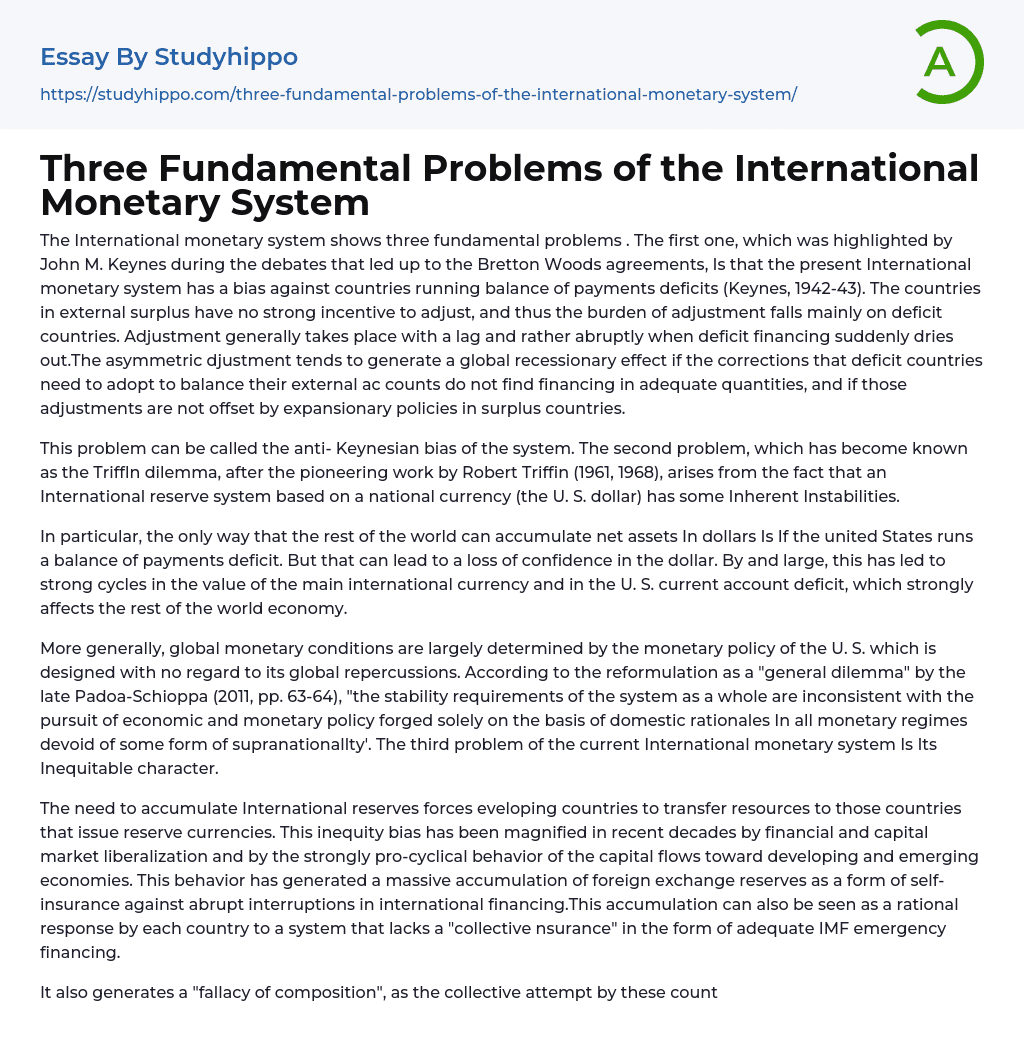

Three Fundamental Problems of the International Monetary System Essay Example
According to John M. Keynes, the International monetary system presents three fundamental problems, the first being its bias against countries with balance of payments deficits. This bias results from the lack of incentive for external surplus countries to adjust, leaving the burden of adjustment mostly on deficit countries. The adjustment process tends to occur abruptly and with a delay, causing a recessionary effect globally if deficit financing suddenly dries out. Asymmetric adjustment creates this effect when deficit countries cannot secure sufficient financing to balance their external accounts and the adjustments are not balanced by expansionary policies in surplus countries.
The system's anti-Keynesian bias can be referred to as a problem. Another issue, known as the Triffin dilemma and from Robert Triffin's research, is due to the inherent instabilities of an international reserve system that utilizes a national currency (specifi
...cally the U.S. dollar).
In order for the rest of the world to accumulate net dollar assets, it is necessary for the United States to maintain a balance of payments deficit. However, this strategy can lead to fluctuations in both the value of the dollar as a primary international currency and the U.S. current account deficit, which can have significant impacts on the global economy and reduce confidence in the dollar.
According to Padoa-Schioppa, the United States' monetary policy has a global impact and neglects the effects it has on other countries. This leads to the "general dilemma," where pursuing domestic-based economic and monetary policies contradicts maintaining stability in non-supranational monetary systems. Furthermore, the international monetary system is viewed as unjust.
The transfer of resources from developing countries to reserve currency countries is amplified by financial and capital market liberalization
as well as pro-cyclical behavior of capital flows towards developing and emerging economies. This leads to a significant accumulation of foreign exchange reserves by countries as a form of self-insurance against interruptions in international financing. Such accumulation can be viewed as a rational response to the lack of collective insurance through sufficient IMF emergency financing.
Accumulating reserves by several countries may result in a "fallacy of composition". This may create a global recessionary bias or lead to an increase in demand for "safe" assets. If the increased demand is not met with an equivalent supply, there may be global financial consequences, especially for the risk premiums associated with the so-called "safe" assets.
- Money essays
- Financial Accounting essays
- Market Segmentation essays
- Supply And Demand essays
- Purchasing essays
- Forecasting essays
- Legacy essays
- Bank essays
- Corporate Finance essays
- Financial News essays
- Financial Ratios essays
- Financial Services essays
- Free Market essays
- Shareholder essays
- Personal finance essays
- Equity essays
- Financial Crisis essays
- Banking essays
- Credit Card essays
- Currency essays
- Debt essays
- Gold essays
- Loan essays
- Enron Scandal essays
- Foreign Exchange Market essays
- Investment essays
- Venture Capital essays
- Stock Market essays
- Retirement essays
- Donation essays
- Net Present Value essays
- Income Statement essays
- Commercial Bank essays
- Debit Card essays
- Deposit Account essays
- Subprime Lending essays
- Perfect Competition essays
- Underwriting essays
- Synergy essays
- Valuation essays
- Investing essays
- Asset essays
- Depreciation essays
- Discounted Cash Flow essays
- Foreign Direct Investment essays
- Funds essays
- Internal Rate Of Return essays
- Revenue essays
- Day Trading essays
- Futures Trading essays



